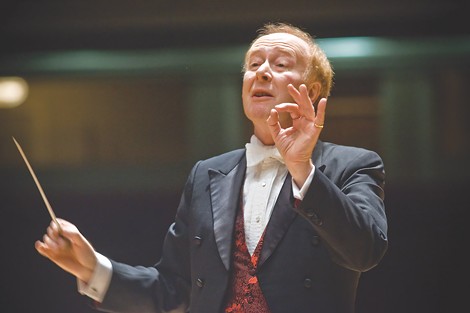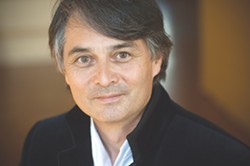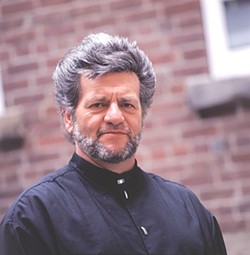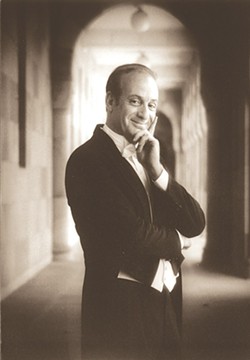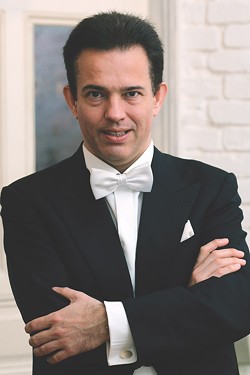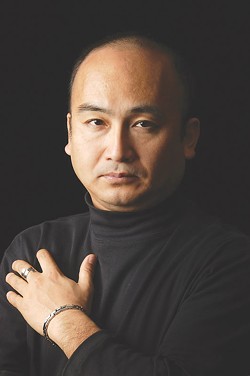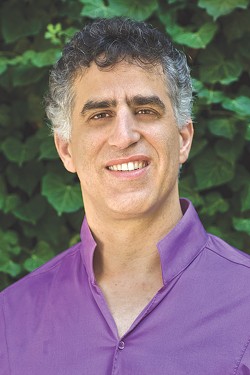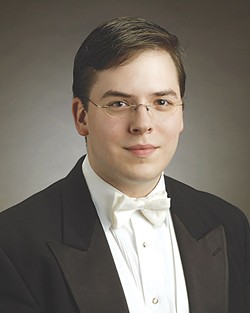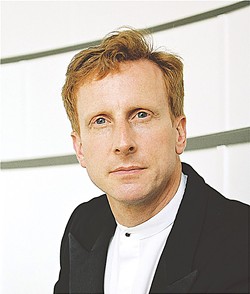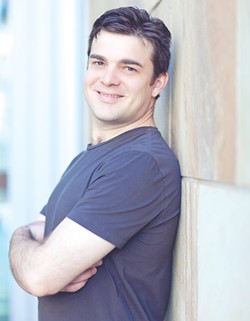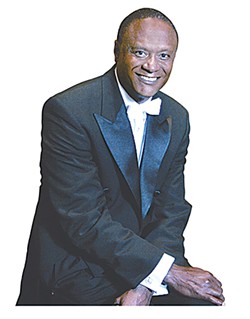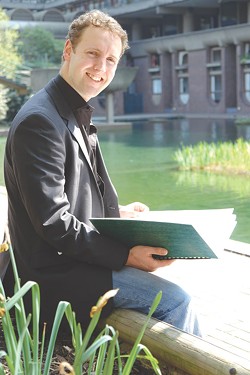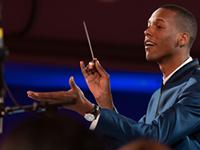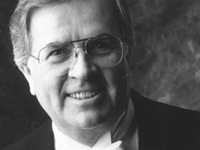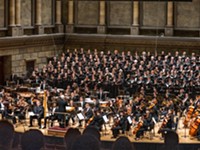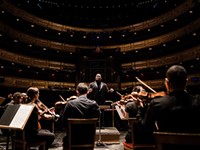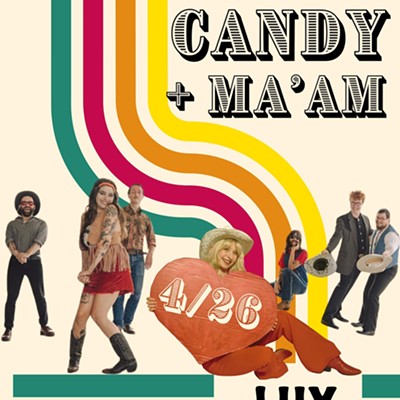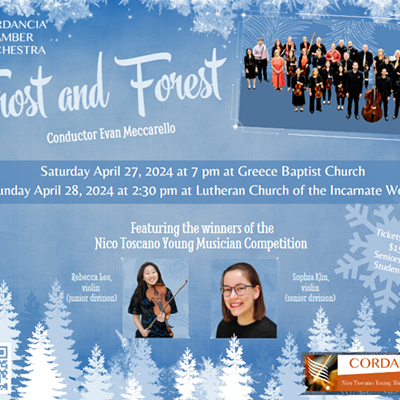CLASSICAL PREVIEW: More than filling the gap
Get to know the guest conductors for the RPO's 2013-14 season
By Paloma Capanna[
{
"name": "500x250 Ad",
"insertPoint": "5",
"component": "15667920",
"parentWrapperClass": "",
"requiredCountToDisplay": "1"
}
]
CORRECTION: The original version of this article contained several erroneous listings for the conductors' birth places and current cities of residence. We have removed those fields.
When I first realized that the 2013-2014 season for the Rochester Philharmonic Orchestra would consist of 13 guest conductors plus one concert with Conductor Laureate Christopher Seaman (March 6 & 8), I worried about plunging ticket sales and musicians without an anchor.
But then I got to thinking about the opportunity this would create for the audience to sample leading conductors of the world, and for the musicians to anchor into each other while welcoming the guest conductors.
It was with these two, completely different thoughts in mind that I undertook to interview the entire line-up of guest conductors in a three-day marathon. My reaction upon finishing the last interview is to be sure to tell you that — even if you never have before — it's time for you to buy season tickets. There isn't a single RPO concert this season that you will want to miss.
What can I say about the 13 guest conductors as a whole? They are all men. They are all self-confident and they directly answered every question I asked. They all have a clear sense of how they want to approach the podium, the musicians, and the audience. They are all well-credentialed, and their resumes include multiple spots as guest conductors.
It is going to be a thrilling season, and I hope that you will join City Newspaper as we cover the RPO for the 2013-2014 season (look for reviews of each main-season classical concert at rochestercitynewspaper.com). If there is any one thing that each and every guest conductor had to say, it was high praise for the RPO and its ability to tackle some of the greatest symphonic works ever written.
Guest conductor: Jun Märkl
Website: junmarkl.com
RPO concert dates: September 26 & 28
Program: Mahler, Mendelssohn, Aaron Jay Kernis (b. 1960)
Guest soloist: Jennifer Koh, violin
"It was the Americans who first really appreciated Mahler," says conductor Jun Märkl. "It took a long time before he became as popular in Europe as he was in the States." Märkl describes Mahler as being "clear in colors, vivid, extremely emotional" and using "stories as the background for his compositions." He adds, "Maybe too much so, but he's dealing with feelings."
As to the upcoming performance of the Mendelssohn Violin Concerto in E-minor, Märkl calls it "one of the most beautiful violin concertos ever written." "It is very classical in form," he says. "It has an early romantic feeling. It is a tender, sophisticated piece that the audience will love."
Märkl prepares not only by studying scores; he has been to Mendelssohn's house to "soak up" the tradition and style, and to reflect upon the composer's Jewish heritage and its role in placing him "on the outside of his homelands in Germany/Austria." And then, Märkl pulls his thoughts through the filter of his own life, consciously, of being German-Japanese and being "a little outside society" and "having to find my own way."
Märkl adds, "The outsiders see it better than those on the inside. And, even though they long to belong, they refuse to belong 100 percent."
It is not only core Germanic repertoire through which Märkl exhibits his strengths. He is also attracted to Debussy, Ravel, and Messiaen, having served as music director for the Orchestre National de Lyon (2005-2011), recorded a nine-CD set of the complete orchestral works of Debussy, and received the prestigious Chevalier de l'Ordre des Arts et des Lettres from the French Ministry of Culture.
Guest conductor: Bernhard Gueller
Website: gueller.com
RPO concert dates: October 17 & 19
Program: Brahms, Bartók, Jennifer Higdon
Guest soloist: Jonathan Biss, piano
Conductor Bernhard Gueller comes to the RPO to conduct a program chosen by the orchestra, which he calls "quite substantial," "difficult," and "big." "I'm quite interested to see how your audience will react," says Gueller. "How conservative is your audience?"
It is an appropriate question, and the same one I had the first time I walked into the Eastman Theater to review a concert with Hungarian composer Béla Bartók on the program. Gueller calmly says, "It's not a piece one has to be afraid of. It is tonal, wonderful, very melodic, rhythmically very interesting. It is based on Hungarian melodies and folk tunes."
Gueller started his musical career as a cellist and played in orchestras for more than 20 years before changing to conducting. He enjoys the connections he makes through youth orchestras. "It's very fresh," says Gueller. "They are hungry to learn. I can remember, myself, how exciting it was the first time I played the Beethoven 5th Symphony."
During his conducting career, Gueller has been music director/principal conductor of the Nuremberg Symphony Orchestra (Germany) and the Cape Town Philharmonic Orchestra (South Africa). Gueller led the Cape Town Philharmonic Orchestra on behalf of the continent of Africa in the 16th International Festival of Music in the Canary Islands.
Guest conductor: Larry Rachleff
Website: http://seldycramerartists.com/bio_rachleff.html
RPO concert dates: October 24 & 26
Program: Copland, Barber, Astor Piazzolla, Manuel de Falla
Larry Rachleff really makes the case for composer Samuel Barber's "The School for Scandal" as being one of the century's "most significant compositions." He points out that it's a "very early piece" for Barber, written when he was only 21 years old, and yet it already reflected Barber's "compositional craft and language." Rachleff says Barber's work is "all-American," reflecting "the 1930's, the jazz influence, the mix of incisive rhythms and colorful orchestrations."
Rachleff describes Copland's "Appalachian Spring" as "25 minutes of the most powerful connection." He expanded on why we share that experience, listening to Copland's music, comparing it to Russians hearing Rachmaninoff or Germans hearing Bruckner. "With Copland, we know where he walked in Tanglewood in the summer and what jazz clubs he went to in Manhattan. Copland, Ives, Barber, and Gershwin were all soulful composers who were richly connected to the American experience."
"This kind of program requires an enormous range from the orchestra," says Rachleff, "the flavors of Copland, the rhythms of Barber, the style of Piazzolla, and the wild aroma of Falla."
As a champion of public-music education, Rachleff sees that responsibility continuing into our job as the public to attend concerts. "Yes, there are war horses," says Rachleff, "but we must find a way to be motivated by our own unique connection to the dramatic message of the piece."
Guest conductor: Christoph Campestrini
Website: christophcampestrini.com
RPO concert dates: November 7 & 9
Program: Stravinsky, Mozart, Tchaikovsky
Guest soloist: Barry Snyder, piano
From Austria to Julliard, Columbia, and Yale, and then on to more than 100 orchestras on five continents, conductor Christoph Campestrini looks for the depth in every work. "It is important to know it stylistically and it is equally important to feel it; you must juxtapose both," says Campestrini.
With the RPO, he'll take on an interesting program that includes a work written by Stravinsky, inspired by Tchaikovsky, and a major work of Tchaikovsky. "This is a double bonus," says Campestrini. "You have a great composer of the 20th century, looking at a great composer of the 19th century, being performed in the 21st century. It's all layers. It's all part of one great tradition and cultural heritage of gorgeous musical and artistic concepts."
Campestrini finds it "most gratifying to reach a communion of emotion as one with the musicians and to communicate that to the audience" and he credits the RPO with the "innate ability to plunge into the emotional message right away, paired with the technical ability to execute the work." He previously conducted the RPO in 2012.
Guest conductor: Junichi Hirokami
Website: tennantartists.com/junichi-hirokami/index.php
RPO concert dates: November 14 & 16
Program: Rachmaninoff, Strauss, Hindemith
Guest soloist: Erik Behr, oboe (RPO Principal Oboe)
Although conductor Junichi Hirokami was not available to participate in these interviews by press time, we can take from his website his studies of conducting, piano, musicology, and viola at the Tokyo College of Music. He also had the opportunity to collaborate with legendary Russian pianist Vladimir Ashkenazy, including a tour of Japan with the NHK Symphony Orchestra (Tokyo). Since 2008, he has been the chief conductor of the Kyoto Symphony Orchestra (Japan).
Guest conductor: Nir Kabaretti
Website: nirkabaretti.com
RPO concert dates: November 21 & 23
Program: Kevin Puts (b. 1972), Beethoven, Saint-Saens
Guest soloist: Edward Arron, cello
Nir Kabaretti is a man of the world. He was born in Israel, studied in Vienna, has lived also in Madrid, calls Florence his current home, and is based part-time in the United States, where he is the music & artistic director of the Santa Barbara Symphony. He speaks Hebrew, German, Spanish, Italian, and English. Kabaretti calls it "fulfilling" to live his life on three continents every year.
Kabaretti considers it a "plus" to "speak the language," "to read in the way they wrote it," and to "get into the head" of the composers. He considers this true whether he is interpreting the composition or he is selecting works for audiences. "What we would program in the United States is probably not what we would program in Tokyo or Argentina," he says. "It helps to know the milieu where you are working."
Kabaretti conducted the RPO as part of the "Summer Serenades at Hochstein" series in 2012. He considers the RPO "up to any challenge." Kabaretti says he is "extremely excited" to prepare musically and mentally for the upcoming performance, and he hopes to work with the RPO to bring the audience a performance that is "relevant to today, specific to the composer, and unique in its delivery."
Guest conductor: James Feddeck
Website: opus3artists.com/artists/james-feddeck
RPO concert dates: December 12 & 14
Upcoming Program: J.S. Bach, Ottorino Respighi
Along with: Eastman Chorale, William Weinert, director
Guest conductor James Feddeck will come into Rochester to conduct the "Magnificat" by J.S. Bach. What else could you need to know? Some works are simply so seminal in the history of Western classical music as to define the conductor.
Feddeck, however, identified his challenge as delivering an audience experience in the modern concert hall that is as intimate as it would have been when originally presented in a church or royal court setting. Feddeck says, "I am facilitating the orchestra and singers to come together to create something greater than either by itself. There is an extraordinary feeling that comes from a true collaborative process for a performance like this — a unification of forces that brings this about."
Feddeck is a sponge, having pursued multiple majors at Oberlin and "loving all music and styles and periods and performing them all." On this same program, Feddeck will take to the harpsichord for the J.S. Bach Orchestra Suite No. 3 in D Major, so that the performance will be in the way it was conceived. "The evolution of a conductor as being at the front of an orchestra was a rather late concept," says Feddeck. "At the time this music was written, the conductor was not that figurehead leading at the front; he was, instead, leading from within."
Guest conductor: Hugh Wolff
Website: hughwolff.com
RPO concert dates: January 16 & 18
Program: Beethoven, Lili Boulanger
Along with: Rochester Oratorio Society, Eric Townell, director
Hugh Wolff was born in Paris, spent his primary school years in London, was Harvard educated, and did graduate studies in Paris. He started as a composer and a pianist, and in college he progressed into conducting when students, eager to put on concerts, needed "somebody waving his arms." Wolff talks of theory, history, and composition, and he finds studying orchestral scores to be "fascinating" in their layers and details.
Although Wolff has spent more than 30 years primarily as a conductor, he points out he doesn't play an orchestral instrument. He has, however, sung in all the big choral pieces, including the Beethoven Ninth Symphony, which he will be conducting in the upcoming RPO program. He is also a pianist and a composer.
Wolff's approach will be to send the parts ahead to the RPO and the Rochester Oratorio Society, with his notes, to save time. "With an orchestra as good as the RPO, no part will be challenging," says Wolff, who engages in guest conducting all over the world, traveling from week to week.
Guest conductor: Fabien Gabel
Website: opus3artists.com/artists/fabien-gabel
RPO concert dates: January 30 & February 1
Program: Debussy, Ravel, Saint-Saëns, Stravinsky
Guest soloist: Philippe Quint, violin
"I'm French and the RPO asked me to build a program with my roots," says conductor Fabien Gabel about his upcoming concert with the RPO, titled "An Evening in Paris" and featuring works of Debussy, Ravel, Saint-Saens, and...Stravinsky?
"Well, you know," says Gabel, "Stravinsky lived in Paris. He had his biggest successes there. He composed his masterworks in Paris — 'Le Sacred u printemps' ('Rite of Spring'), Petrushka, 'L'oiseau de feu' ('The Firebird')." It is the "Firebird Suite" that will be on the RPO program.
So what is it about Paris? "It's Paris," says Gabel, and in two words that rather does explain it all. "Especially at that time [the early 1900's], it was the melting pot of artists, writers, composers. Picasso, Modigliani — they all lived in Paris to be close to the intellectual and artistic environment — Prokofiev, Rachmaninoff, also."
Gabel spoke to rehearsals as being a critical part of his strategic approach to concerts in the role of guest conductor. "Rehearsals can define it," he says. "It is not possible to play the same piece the same way twice. Everywhere I go, even if I have already conducted a piece several times, I treat it as if it were my first."
And, yet, Gabel suggests that giving the musicians "some freedom" is precisely what can bring success to the performance of a well-known piece like Debussy's "Prélude à l'après-midi d'un faune" ("Afternoon of a Faun"). Gabel says, "You can't give a nice beginning to this work with a gesture. It has to be organic. It is a very difficult part for the flutist to play, and I have to let her start and find her inspiration."
Guest conductor: Michael Morgan
Website: oebs.org/page/michael.htm
RPO concert dates: February 6 & 8
Program: Ellington, Gershwin, Joseph Schwantner (b. 1943), Florence Price
Guest soloist: Joyce Yang, piano
"Ellington is in a class by himself," says Michael Morgan, who will be conducting the RPO in an all-American concert. "It takes some extra musicians. It takes some extra expense. But 'Harlem' is a great work by Ellington and it is basically unknown." Even Morgan apparently conducted a number of other Ellington pieces before he discovered "Harlem," but he has fought for the budget to put on this work ever since.
Morgan feels similarly about the Gershwin piano concerto that is on the program. "It is a masterpiece, but it doesn't get its due," says Morgan. "Gershwin has a reputation for being a pops composer, even after he wrote the opera 'Porgy and Bess.' He had a very hard time being taken seriously."
The way Morgan talks about Ellington and Gershwin, you would think that every American would have a natural ability to perform works by American composers. "Certain styles, we hear and are around, and it's like osmosis. An American orchestra is going to be well-suited for this program of American music."
Morgan also says that whether you have heard of Price of Schwantner, composers whose works are also on the program, it's going to be "a good night to give the orchestra a try." You have Ellington. You have Gershwin. You have Price, who Morgan says was "a hero to everybody as a composer and an arranger of spirituals for orchestras and singers at a time when women barely had a voice." And you have Schwantner, whose work puts great music behind the best speeches by Dr. Martin Luther King, Jr. and others, "elevating both things to new heights," he says.
Guest conductor: Michael Christie
Website: michaelchristieonline.com/mc/
RPO concert dates: April 10 & 12
Program: Howard Hanson
Conductor Michael Christie will be the one to take the RPO to Carnegie Hall next spring to perform Howard Hanson's lyrical opera "Merry Mount." But first, he'll deliver it to the home crowd. Christie is from Buffalo. Hanson (1896-1981) was director of Eastman School of Music 1924-1964, and his "Merry Mount" was commissioned by the Metropolitan Opera in 1933.
Christie has been studying Hanson's portfolio of works and considers the lyric opera to "use up all the colors that Stravinsky brought to the beginning of the 20th century, and then add the reverence and grandeur of America. There are big, sweeping build-ups. It's such a different American voice. There was Copland and Bernstein, and Hanson was just as individual."
The work will be a not-insubstantial challenge. Christie anticipates added rehearsals, and a need to ensure the stamina of the orchestra and the vocalists for this 90-minute work. He credits the RPO and ESM for taking "such an enormous cast of characters to Carnegie." "The Merry Mount" apparently involves a "really big chorus plus individual characters and an orchestra."
Listening to Christie, who has conducted American operas and concert operas for more than 20 years, one gets the impression that he is comfortable with big — big scores, big groups of musicians and vocalists, and big sound. Perhaps it has something to do with the view he can catch in between conducting engagements around the United States, as he pilots his own single-engine, four-seat, Mooney airplane.
Guest conductor: Thomas Wilkins
Website: omahasymphony.org/music_director.asp
RPO concert dates: May 22 & 24
Program: Shostakovich, Jim Beckel (b. 1948), Alexander Arutiunian
Soloist: Douglas Prosser, trumpet (RPO Principal Trumpet)
As soon as he says, "Hello," there is a certain laid-back quality that comes across from conductor Thomas Wilkins that makes you want to pour a cup of coffee and sit down to chat with him. He begins the conversation by reflecting on his largess about life coming into focus for a work as big as the Shostakovich Tenth Symphony.
Wilkins has known he wanted to be a conductor since he was 8 years old and first heard a live symphony concert. He was captivated by the sound, and by the man standing in front who he called "the first participant in the creation of the sound." By seventh grade, he made it to the podium before a student ensemble, where it "didn't go well," but he felt the encouragement of his teacher, and continued to find others with a guiding hand as he went through his studies at Shenandoah University and then the New England Conservatory of Music.
Wilkins sees being a high-profile conductor as an opportunity to serve as God's hand to shape the world around him, one individual at a time. And it may be that the story he tells that will most resonate with us is that of a college student who came up to him after a concert, asking what it meant that she had found herself in tears at the end of a Copland piece, when she had only attended the concert as a course requirement.
Guest conductor: Michael Francis
Website: cami.com/?webid=2013
RPO concert dates: May 29 & 31
RPO program: Walton, Gustav Holst
Conductor Michael Francis could just as easily be a narrator or actor from the Royal Academy of Dramatic Art. It's not just that he's English. He's a natural storyteller, which makes his presence at the podium for the RPO season finale particularly sweet. He'll be conducting two significant works that reflect stories, William Walton's "Suite from Henry V" and Gustav Holst's "The Planets." "These are warhorses of Englishness," says Francis. "The English reaction to extreme emotions is unique in the world. There is a slight sense of reserve, even in the painful understanding of the ravages of war."
Francis describes the "Henry V Suite" as "really strong," and it's worth noting that it has been used in everything from a 1946 LP with Laurence Olivier narrating to the 1989 movie "Henry V," starring Kenneth Branagh.
Our conversation on "The Planets" is more involved. A work in seven movements, written between 1914 and 1916, it cycles through the astrological concept of the influence of the planets upon the psyche. "The timing for Holst was so poignant," says Francis. "The terrible war, the end of the Golden Era, a time shown in 'Downton Abbey,' and a sense of innocence eroded."
Francis' preparation as a conductor is a journey of "finding the human qualities behind the music," asking "what does it mean?" and "what does it tell us?" He does not only his research, but also considers how the audience will react to the story behind the music that will be performed. Francis has a reverence for original scores of the composer as being a "gold mine of little markings."
But, it's not just storytelling or research that impacts Francis' philosophy as a conductor. Francis notes that there is a "tremendous psychology" on how a conductor communicates with the orchestra. "They are a collective of people. They may have played the work before and with a better conductor. There are the technical details," says Francis. After a pause, he continues, "And then, there is the overall vision of the piece I bring to the podium, while giving the musicians the permission to fill in the gaps."
Speaking of...
Latest in Classical
More by Paloma Capanna
-

The multisport multiverse
Apr 30, 2014 -
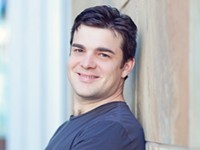
CLASSICAL | Rochester Philharmonic Orchestra
Apr 9, 2014 -
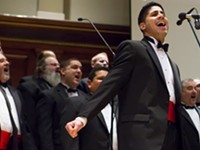
POP/CLASSICAL | Rochester Gay Men's Chorus
Mar 26, 2014 - More »
